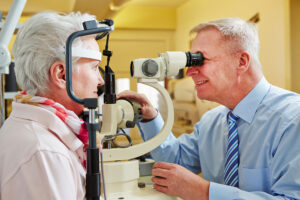Cataract Risks and Symptoms
Most cataracts occur simply because we get older. It’s estimated that more than half of those over 80 will have a cataract at some point. This condition that occurs on the lens of the eye is caused by the proteins that break down the lens of the eye. These cataracts can happen to one eye or both and they can occur on several different areas of the eye lens. Cataracts can appear on the cortex, the nucleus, and/or the thin membrane that covers the lens, creating several cloudy areas on the lens. Having home care providers available to assist seniors when their vision is impaired can be important for their safety.
When do Cataracts Occur

Home Care Essex County NJ – Cataract Risks and Symptoms
For many people, cataracts start in their 40s-60s, but they don’t cause any symptoms so the person doesn’t know it. Even if it’s seen by your loved one’s optometrist or ophthalmologist during a routine eye exam, they will often recommend waiting until any action is taken if the cataract is not currently causing any sight concerns.
What Increases the Risk of Cataracts
While age is the main risk factor for getting cataracts, and the one that you’re loved one can’t do anything about, several other factors may increase their risk of developing a cataract.
- Health conditions like diabetes or high blood sugar
- Exposure to tobacco smoke by either being a smoker or living with one
- Extreme alcohol consumption
- Exposure to chemicals and pesticides
- Using corticoids to treat conditions like rheumatoid arthritis
- Family history of cataracts
Cataract Symptoms
Regular eye exams will spot cataracts before your loved one has any symptoms but if your loved one doesn’t have regular eye exams, he might experience some of these symptoms.
- Halos and streaks appear around light sources, creating a glare that makes night vision especially difficult.
- Colors that start to look less vivid. The world may look like the color is fading out of it. The deep, rich color of the world is hard to see.
- Bright light like the sun or car head beams at night can hurt the eyes, making your loved one look away with discomfort.
- Vision that is blurry, cloudy, or foggy.
- Near-sightedness that gets worse.
Cataracts are not painful in and of themselves but can cause discomfort when viewing bright lights by making the eyes much more sensitive than normal.
Home Care Can Help
If your loved one currently has cataracts and is waiting for treatment, the most difficult thing he might find that he can’t do anymore is to drive at night. Driving at night gets more difficult as a person gets older for several reasons, but when cataracts are added to those conditions, it can become dangerous for your loved one to drive at night or even at times of the day when the sun is glaring into the window. During winter months, that can mean driving is almost impossible all of the time.
A home care provider can step in and help with transportation until your loved one can drive safely again. A home care provider is a great resource for rides to appointments, events, and everyday errands. They will bring your loved one where he needs to go and home again safely.
If your loved one needs surgery, a home care team can also be a great resource when he is recovering from his surgery as well.
If you or an aging loved one are considering hiring professional Home Care Services in Essex County NJ, please talk to the caring staff at Generations Home Health Care today.
Providing Home Care in Somerset, Essex, Union, Morris, and Hunterdon Counties. Call us today at (908) 290-0691 or (973) 241-4534.
- Rainy Day Alzheimer’s Activities to Do with Your Loved One - March 24, 2025
- Our Nurses Became Certified in Mental Health First Aid - March 12, 2025
- Celebrating 10 Years of Generations Home Healthcare! - March 11, 2025


